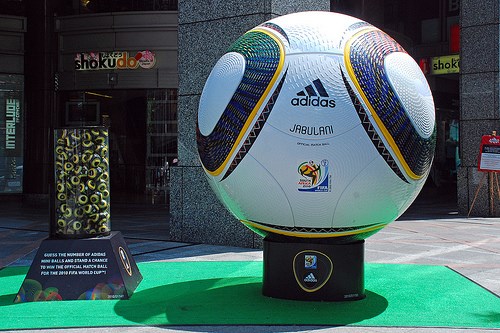FIFA sets up match-fixing hotline

The official match ball for the FIFA World Cup in South Africa 2010. Photo (c) flickr user chooyutshing. Used under a Creative Commons 2.0 licence
02.06.2010
By Katja HøiriisTo step up the fight against match-fixing before the 2010 World Cup, FIFA has set up a confidential hotline for players, coaches and referees to use if someone attempts to bribe them. The hotline will be just one of the measures taken by FIFA in their attempt to minimize the threat of match-fixing during the tournament, writes Reuters.
FIFA’s Early Warning System, which monitors the betting market for suspicious activity, is also in place and will monitor all of the World Cup matches. Also, 400 bookmakers have agreed to report on irregular betting, which might be a sign of corrupt activities.
"Although it is impossible to guarantee that any competition is safe from attempts to externally influence matches, FIFA is doing everything in its hands to ensure that the risk is minimized” FIFA said in a statement.
All participants in the tournament are bound by a FIFA code of ethics and are given information on betting, match-fixing and the monitoring system before the tournament kicks off.
In April, the Canadian match-fixing expert Declan Hill commented on FIFA’s efforts to fight match-fixing in an article on Play the Game’s website.
Here, he says that FIFA’s Early Warning System is “a good start and a bad joke”. Monitoring the gambling market for irregular behavior is nearly impossible in an event as big as the World Cup. Moreover, the Early Warning System relies on information from the legal bookmakers and does not cover the illegal Asian gambling market where the fixers do most of their work, he says.
So in order to seriously fight match-fixing, Declan Hill argues that FIFA ought to look at the cause for why some players might be tempted to accept bribes. “The fact is that some of the athletes competing at the world’s biggest sporting event still do not know how much money they will be paid or even if they will be paid at all. It is this dynamic that drives match-corruption” he says.
“It is very easy to stop the problem. FIFA should pay the players directly” Information about payments should be made public so that the players know what they can expect to get and that they will actually get paid – and paid well.
Read the complete article by Declan Hill here: J’accuse FIFA
More information: Reuters





